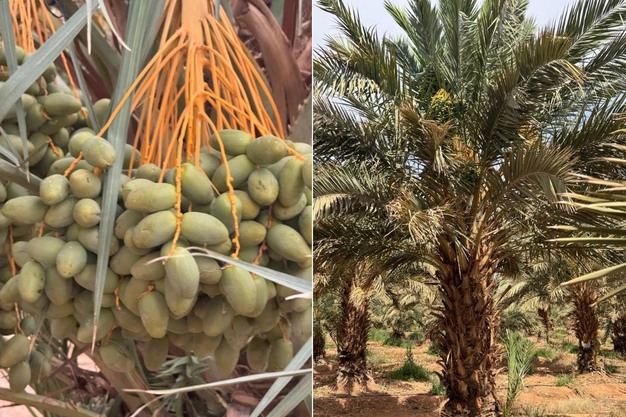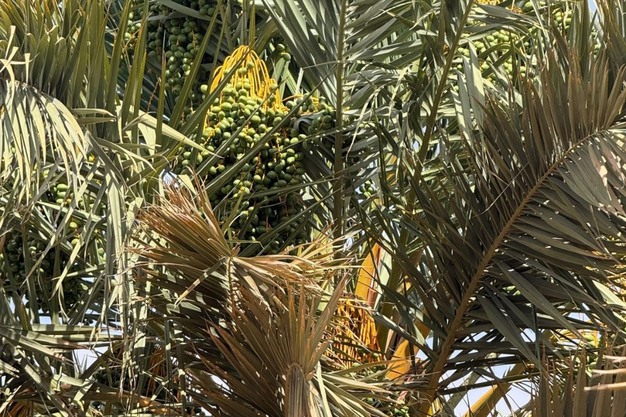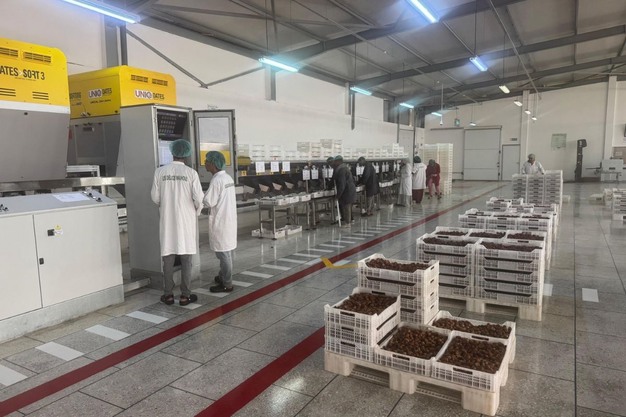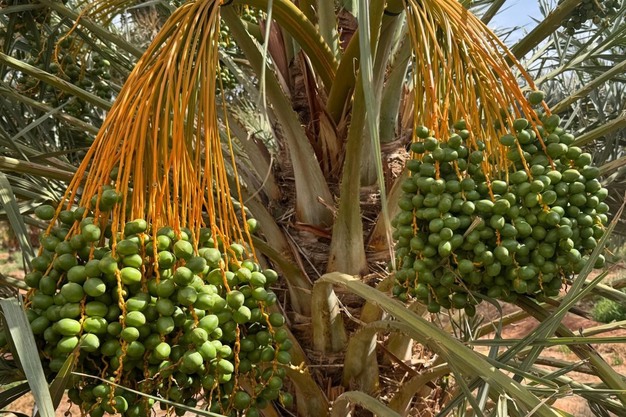Moroccan Medjool growers in the Boudnib region, the historic cradle of the Medjool date variety, are preparing to launch the 2025/2026 season in September. Technical preparations are accompanied by aggressive commercial efforts aimed at opening new markets, as global enthusiasm for date consumption intensifies competition between different origins. The East Asian market, one of the premium markets for fresh produce, is of particular interest to Moroccan producers. A long-standing target for exporters of high-value-added products such as berries, it is now the turn of Moroccan organic Medjool exporters to take an interest in this market.
 © Les Délices Majhoul
© Les Délices Majhoul
“The East Asian market is showing growing interest in organic products”
Les Délices Majhoul, a producer of organic Medjool dates in Boudnib, which until now exports exclusively to Europe, is now preparing to enter the East Asian market through Japan. Ali Ben Bachir, co-founder of the company alongside Kamal Salimi, describes a market with great potential: “We want to break away from the beaten track of the European market, which we know well, to reach cultures and consumers who are not yet sufficiently familiar with organic Medjool dates. The Japanese market represents an opportunity for us to explore: the initial feedback we are receiving is very encouraging. There is a growing enthusiasm in Japan for natural and authentic products with a history, which fits perfectly with the DNA of our La Maison du Majhoul brand.”
According to Ben Bachir, there are several reasons to focus on the East Asian market, other than the opportunity offered by the month of Ramadan in countries in the region with large Muslim populations. He says, “There is global hype surrounding Medjool dates, and these dates are recognized in the market at their true value. At Délices Majhoul, we also have a strong argument following our transition to entirely organic date production: according to a FAO report, demand for organic products in Asia is growing at an average rate of 6% per year, which shows consumers’ growing interest in healthy, traceable products that promote environmental values. Although demand for organic products stabilized or even declined immediately after the COVID-19 pandemic, it is now experiencing a significant rebound, particularly in Europe, but also in certain high-end niches in Asia. The East Asian market, like in Japan, Singapore, and South Korea, is showing growing interest in organic, traceable, and meaningful products. Organic products are often perceived not only as a label, but also as a guarantee of transparency, health, and environmental commitment.”
 © Les Délices Majhoul
© Les Délices Majhoul
Les Délices Majhoul to be present à BioFach Japan
“Our privileged gateway to the East-Asian market will be the Biofach Japan trade show, which will be held this week in Tokyo, where we will participate with enthusiasm and a thirst for knowledge, represented by our commercial director, Jaafar Salimi,” Ben Bachir adds. “After our remarkable participation in the Biofach trade show in Nuremberg in February 2025, a true global gathering for the organic sector, it seemed natural to us to continue this momentum toward new horizons. We therefore see this participation as a step towards discovery, learning, and long-term establishment. We hope that this trade show will enable us to better understand the expectations of Japanese players, assess the real potential of our product in this very specific cultural context, and lay the foundations for a future partnership in Asia. We approach this step with great humility. This is still relatively unknown territory for us, where we do not yet have significant commercial experience. At this stage, we do not know how Majhoul Organic dates are perceived locally: are they considered a festive product, a health food, a product destined to an ethnic market, or a refined gift? This is precisely what we hope to discover.”
 © Les Délices Majhoul
© Les Délices Majhoul
Packaging and logistics are important areas of focus
The exporter explains that through this trade show, he wants to listen to buyers and validate or refute certain commercial and logistical hypotheses that will enable him to adapt to the Japanese market. He explains, “We know that our Majhoul Bio dates, rich in history, flavor, and commitment, have a place in this part of the world, but this will first require listening, adapting, and respecting local specificities, particularly in terms of packaging. For example, we know that the Japanese market favors attractive packaging, small formats, legible organic labels, and the absence of cultural references, unlike what we see in Europe or the Middle East. Consumers therefore prefer individual or small packaging, often neat, elegant, and practical. However, we still need to determine the preferences of importers and the B2B approach to adopt, as we are also seeing the emergence of a new trend in several of our markets, where importers prefer to receive products in bulk and repackage them on arrival. This is one of the most important details we want to discuss with Japanese professionals at BioFach Japan. Product-wise, too, we believe that visual consistency, soft texture, and melt-in-the-mouth quality will be key factors in consumer acceptance. Organic produce is certainly perceived as a guarantee of quality, but this must be accompanied by complete transparency regarding origin, agricultural practices, and traceability.”
Logistics also remains an aspect that must be mastered down to the slightest detail. Ben Bachir states: “Transport to East Asia is a real logistical challenge, but it remains perfectly manageable for a product such as Majhoul Organic dates. The current crisis in the Red Sea has, of course, had an impact on traditional shipping routes, sometimes forcing traffic to be diverted to southern Africa, which lengthens delivery times and increases costs. But from a technical point of view, this does not pose any storage difficulties: our organic dates are perfectly suited to these logistical constraints thanks to our controlled cold storage infrastructure. In certain specific cases, particularly for small volumes with high added value, air transport may be considered, as is already the case for certain high-end Moroccan agricultural products shipped to Japan, Qatar, or the United Arab Emirates. This is an option that we are fully prepared to activate depending on demand. Logistics costs obviously have an impact on the final price for the consumer. This is one of the many points that Jafar Salimi will address in a spirit of complete transparency during his meetings at BioFach Japan. Discussions on volumes, frequencies, transport options, and Incoterms will be essential to establishing viable long-term partnerships with Asian players.”
 © Les Délices Majhoul
© Les Délices Majhoul
Organic production is the primary driver
The Moroccan producer took on the agronomic challenge of a complete transition from conventional to organic production, a strategic decision that Ben Bachir defends. He explains: “It is true that some players in the conventional market see organic farming as a differentiation strategy rather than a response to real demand. It is a point of view that we respect, but do not entirely share. At Les Délices Majhoul, our commitment to organic farming is both a strategic choice and a deep conviction. It is not just a question of standing out in a competitive market, even if, in a context where the supply of Medjool dates is increasing, differentiation is legitimate, but above all, of placing our project within a global ethic: respect for the land, for consumers, and for the men and women who work alongside us every day.
“We are also to have a strong technical management team with over 30 years of experience and expertise in the agronomic challenges. Although yields are lower than in conventional agriculture, the quality remains high and, above all, it is accompanied by a sustainable production model that respects the natural cycles and limited resources of our region. Finally, our decision to go organic is based on a combination of environmental, social, economic, and commercial values. It’s a demanding position, but one that we fully embrace. And if tomorrow a Japanese or Korean consumer chooses our dates over another brand, it may be as much for their taste as for the history, values, and commitment behind them,” Ben Bachir concludes.
For more information:
Ali Ben Bachir
Les Délices Majhoul
Tel: +212661152510
Jaafar Salimi
Tel: +212661448785
Les Délices Majhoul
Email: [email protected]
www.delicesmajhoul.com


AloJapan.com